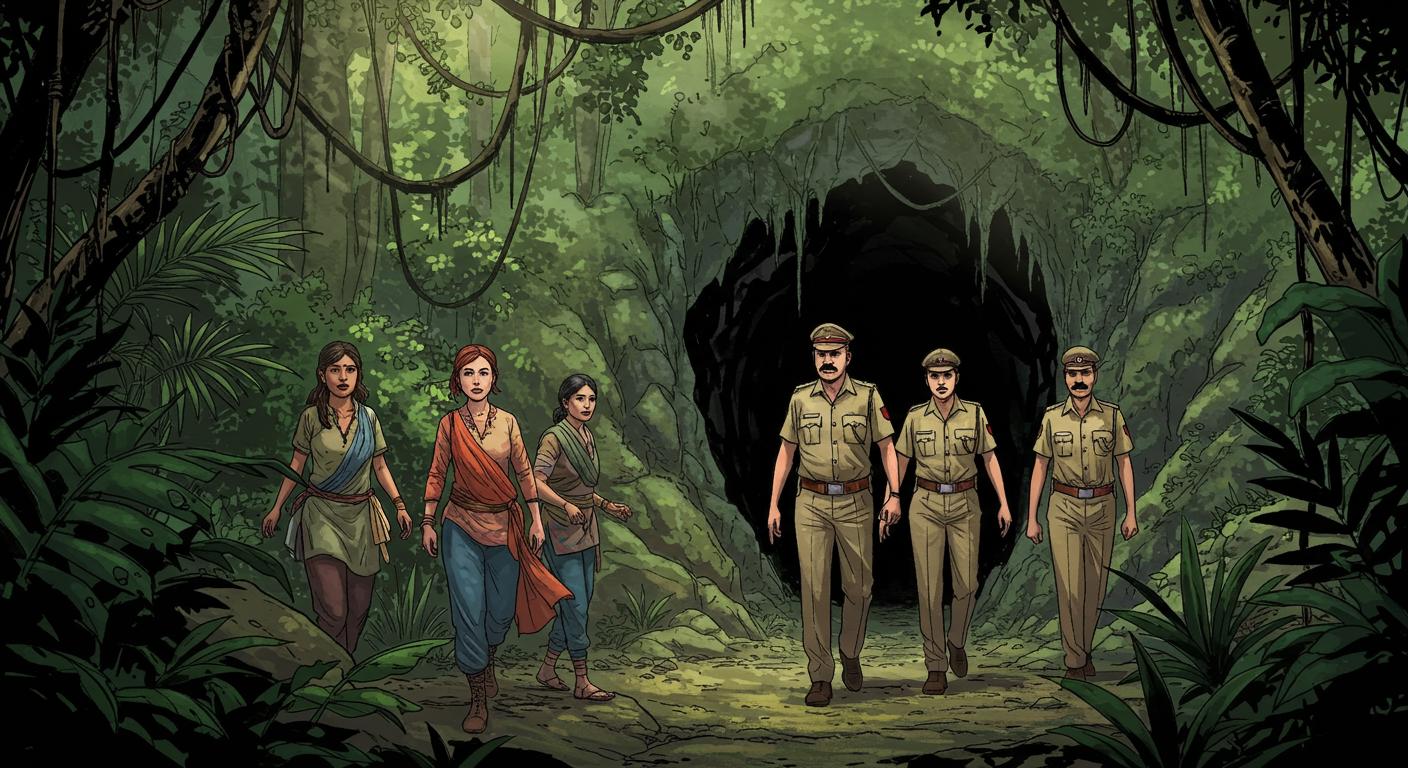Sometimes, reality offers up a story so odd you’d be forgiven for thinking you’d wandered into the wrong shelf of the library—nonfiction’s version of magical realism. By way of Firstpost, with further details courtesy of TFIPost, this is very much an actual event: a Russian woman and her children discovered living not just “away from it all,” but “far above and behind it all” in a perilous cave in Karnataka.
The Ramatirtha Hill Retreat
While conducting an evening patrol atop Gokarna’s Ramatirtha Hill—routine for a place famed for spiritual seekers and tourists alike—Inspector Sridhar S R and his team noticed movement deeper in the trees than most pilgrims or selfie-hunters venture. In a finding highlighted in Firstpost’s report, the officers discovered Nina Kutina (sometimes using the name Mohi) with her two daughters, Prema (age six and a half) and Ama (four), nestled inside a makeshift cave shelter. Not the average sunset lookout spot: the area had seen a significant landslide just the year before and has its fair share of venomous snakes, according to police cited in the outlet.
The family had reportedly been living there for about two weeks by the time they were found. When asked, Nina explained—officials told Firstpost—that she’d come to Gokarna from Goa, seeking a solitude fit for meditation, prayer, and a break from “modern chaos.” Daily spiritual rituals evidently included a Rudra idol, as TFIPost describes, installed right in their rocky abode.
Risk, Rescue, and the Practicalities of Parenting
It’s hard not to marvel at the dedication to one’s quest for silence, but it’s equally difficult to overlook the risks involved—especially for two young children. Forest lands riddled with landslide potential are rarely featured in family travel guides. Firstpost underscores the area’s dangerous wildlife, while TFIPost adds context by noting that local police, after counseling Nina about these conditions, persuaded her and the girls to leave the hill behind.
Responding to the mother’s request, officials arranged for temporary shelter at an ashram in Bankikodla village under the care of Swami Yogaratna Saraswati, an 80-year-old female monk. Welfare officers confirmed to TFIPost that both children, though physically unharmed after days in the wild, had gone without basic medical care or hygiene facilities—raising understandable concerns.
Visas, Caves, and Legal Reality
Stories of spiritual retreats often brush up against the unconventional, but this one quickly intersects with something far more procedural: visa documentation. When police gently probed for her paperwork, Nina was hesitant, later admitting—according to welfare officials quoted in both outlets—that her documents might be lost back up in the cave. A joint search by the police and Forest Department eventually produced her passport and visa.
Detailed review of the documents, as Firstpost documents, revealed that Nina had arrived in India on a Business Visa valid until April 2017. An exit permit from FRRO Panaji briefly marked her departure to Nepal in 2018, but immigration records, cited in TFIPost, show she re-entered India later that year and failed to leave as required. The family’s prolonged stay has since been classified as an immigration violation.
From Cave Dweller to Custody Case
With the legal picture now clarified, the Uttara Kannada Superintendent of Police initiated coordination with the Foreigners Regional Registration Office in Bengaluru, aiming to organize the family’s deportation. Currently, Nina and her daughters remain in protective custody at the Women’s Reception Centre in Karwar, overseen by the Department of Women and Child Development, both articles note. Proceedings are set to continue in the coming days, with the family’s ultimate fate now in the hands of Indian immigration authorities.
Local reactions, as referenced by TFIPost, have ranged from sympathy for Nina’s spiritual longing to outright criticism—some neighbors finding her quest romantic, others more alarmed by the risks to her children and disregard for visa regulations. The dichotomy is, perhaps, as inevitable as it is interesting.
Off-Grid, On-the-Record
The sight of a family carving a life out of a hillside cave—driven by spiritual urge, or dissatisfaction with civilization, or both—feels custom-written for a chapter on human eccentricity. Yet, as both outlets remind us, the divide between personal freedom and social responsibility, especially regarding child safety and legal status, is rarely resolved without intervention.
One can’t help but wonder how many unconventional wanderers slip quietly between the system’s cracks, seeking some peace not found on the map. At what point does the pursuit of solitude become a matter for official attention? What counts as admirable resilience, and what drifts into recklessness? In the case of Nina and her daughters, the answer, it seems, comes not in spiritual silence, but bureaucratic paperwork—proof that even the most off-grid journeys eventually circle back to someone else’s desk.







